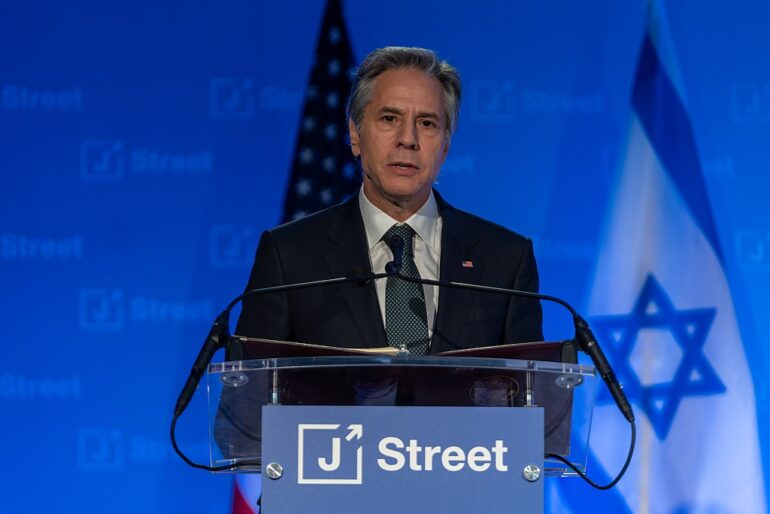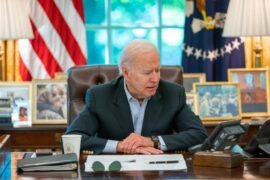Israeli journalist Barak Ravid reported for Walla that a high level meeting took place at the White House last week to determine US policy towards what’s expected to be Israel’s new incoming government.
According to the report, the meeting was part of a National Security Council forum, of which representatives from the American State Department, Defense Department and intelligence organizations took part.
The meeting reportedly discussed potential methods for dealing with the new coalition being put together by Binyamin Netanyahu (Likud), and specifically focused on the question of how best to engage with designated ministers like Betzalel Smotrich (Religious Zionism) and Itamar Ben-Gvir (Otzma Yehudit) who are known to be staunchly opposed to the regional interests of the United States.
US Mideast policy has for decades sought to divide the land of Israel into two separate states – each dependent on Washington for survival. While Smotrich and Ben-Gvir each have a troubling history of inflammatory language against Palestinians, US officials have in the past ignored such rhetoric from more westernized Israeli leaders – especially when said language was being deployed to convince the Israeli public of the need to “separate” from Palestinians through a “two-state solution.”
What clearly troubles the Americans about Smotrich and Ben-Gvir is their militant opposition to dividing the country and their vocal support for applying full Israeli sovereignty to the West Bank.
Earlier this week, US Secretary of State Antony Blinken explicitly told the Liberal Zionist J Street conference that the Biden administration “will object to any move [by Israel] to annex the West Bank.”
While Washington is likely still formulating a strategy for how it can most effectively neutralize figures like Smotrich and Ben-Gvir, Jewish voices are already being galvanized to threaten Netanyahu’s government.
J Street President Jeremy Ben-Ami has expectedly been one of the loudest voices warning that Diaspora Jews could politically abandon Israel over the new coalition coming together in Jerusalem.
“This is a very significant crossroads,” Ben-Ami told the Associated Press.
“The potential for specific actions that could be taken by this government, these are the moments when the relationship between the bulk of American Jews and the state of Israel begins to really fray.”
As an organization specifically tasked with promoting the two-state paradigm amongst the American Jewish community, it makes sense that J Street would issue such warnings against an Israeli coalition comprised of factions vehemently opposed to partition. But warnings of a rift between Israel and Diaspora Jews are not only coming from J Street.
Rick Jacobs, president of the Union for Reform Judaism, said in a statement this week that Netanyahu’s coalition allies “are among the most extreme voices in Israeli politics.”
“What will be the trajectory of a new Israeli government with such voices in such key leadership roles is of deep, deep concern.”
Abe Foxman, the former head of the Anti-Defamation League who has long claimed that nothing could break his support for Israel, now says that politicians like Smotrich, Ben-Gvir and Avi Maoz (Noam) could do just that if they receive the power to advance their goals.
“I never thought that I would reach that point where I would say that my support of Israel is conditional,” Foxman said in an interview with The Jerusalem Post last week.
“I’ve always said that [my support of Israel] is unconditional, but it’s conditional. I don’t think that it’s a horrific condition to say: ‘I love Israel and I want to love Israel as a Jewish and democratic state that respects pluralism.’”
“If Israel ceases to be an open democracy, I won’t be able to support it,” he said.
Outgoing Prime Minister Yair Lapid (Yesh Atid) and much of Israel’s media establishment have meanwhile been leading a hysterical campaign of incitement against Netanyahu and his partners. Lapid, who appears to see himself as the political leader of Israel’s westernized ruling class, has raised the volume on divisive rhetoric aimed at delegitimizing the new coalition before it’s even formed. The fact that Netanyahu has reportedly taken steps to replace the drivers of his motorcade indicates that he might genuinely fear Lapid’s incitement could lead to violence.
When examining these warnings by westernized Israelis, prominent American Jews and the US administration, it’s important to separate the two major concerns being expressed. The fear that Netanyahu’s new coalition could potentially weaken Israel’s democracy, threaten the human rights of vulnerable groups and transform Israel into a society less in step with liberal values is a valid one that needs to be carefully considered and addressed.
The second fear – that Netanyahu’s new coalition could drive the final nail into the coffin of the two-state paradigm – is one we should actually support reaching fruition. Partition has always been an imperialist solution meant to strengthen US influence while inciting conflict between Israelis and Palestinians on the ground. But one highly effective way to ensure this new government shifts Israel away from partition and towards annexation would be to address the fears of the Israelis and Diaspora Jews that Netanyahu, Smotrich, Ben-Gvir, Maoz and their Ḥaredi partners will lead Israeli society in a dramatically illiberal direction.
Nearly every contentious political and social issue in Israeli society is an expression of a deep tension between the forces of Western liberalism and Jewish national particularism. And while it’s clear that the latter is growing stronger at the expense of the former, that shouldn’t be our goal. The process of Israel’s national development, from European-style Jewish nationalism (Zionism), to a more uniquely Jewish brand of national consciousness to a Hebrew Universalism rooted in our people’s ancient identity and worldview but facing the rest of humanity in the modern world, requires deeply Jewish answers to some of Israel’s most pressing contemporary social and political challenges.
Lapid and his outgoing coalition partners (with the exception of the United Arab List) aren’t capable of thinking outside the box of liberal ideology and a global order enforced on the world by an empire in rapid decline. Their only vision for the country’s future is to be an American-backed outpost of Western civilization in the Middle East. Israel’s path forward will therefore need to come from the forces of Jewish particularism that the Biden administration is scrambling to neutralize.
But there’s a catch.
For Israeli society to properly advance, the factions comprising the new coalition and the voters they represent will need to address the concerns of their opponents by developing a genuine sensitivity to the sectors of society (Palestinians, African asylum seekers, LGBTQ+ people, descendants of Jews who are not actually Jews according to how we’ve defined the term for thousands of years, etc.) that appear most at risk by the direction Israel is moving in and to find solutions rooted in authentic Hebrew teachings that address their needs.
The Israeli public and Jewish Diaspora need to see that Israel can resist US pressure, apply sovereignty to the territories and become a more deeply Jewish society without oppressing, excluding or marginalizing anyone.





